A oil
B acid
C ethanol
D soil
E wine
Have you ever been embarrassed by the frequency of your fart? If your answer is in the affirmative, then you need not worry because everybody does it, but the degree of occurrence differs from one person to another. While farting is a natural part of the digestion cycle which releases excessive gas from the body, it could also be worrisome if it occurs too often.
However, there are divergent opinions of experts on the appropriate frequency of farting in a healthy human being. While some said 10 times a day is normal, others said 15-20 times a day is still in the normal range in a healthy human being, as it is a reflex action which occurs even in sleep.
According to Dr Beth Mallard, lecturer in physiology at NUI Galway, “From what I’ve found, 10 times a day is normal to fart, but up to twice that can be considered normal, with a big range in the volume as well”.

Nonetheless, if you have observed that you unusually toot and it comes very smelly, there are natural tips you can adopt to reduce the occurrence as well as prevent the bad odour that comes with it, because there are farts that come unnoticed and without smell.
Here is a list of possible remedies as highlighted by Medical News Today for those who feel they have excessive gas:
The majority of gas produced by the body forms because of swallowed air. A person cannot completely avoid swallowing air, but certain habits can cause excess air to enter the body. Eating too quickly is one of them.
Eating slowly with the mouth closed will reduce the amount of air a person swallows at mealtimes. People should try to sit down and take time over food rather than eating on the go.
Many people chew gum to keep their breath fresh and to help avoid snacking. However, those that do may find they have more gas than others. Chewing gum means continually swallowing air, which builds up and increases the number of times a person needs to fart.
Some foods are known to increase gas production. Carbohydrates that contain fructose, lactose, insoluble fiber, and starch ferment in the large intestine. Gas releases as they ferment.
Cutting these foods out entirely, however, is not recommended, as they are an essential part of a healthful, balanced diet.
Fruit and vegetables can often cause gas, but eating several portions of fruit and vegetables a day is more important than eliminating gas. However, reducing the amount of these gas-producing foods may help to minimize a person’s flatulence.
People who smoke swallow more air than those who do not. The more frequently a person smokes, the more air they swallow. There are, of course, lots of other health benefits to giving up smoking, too.
People who use e-cigarettes also swallow more air than people who do not, so avoiding e-cigarettes could also help when a person has excess gas.
Staying well-hydrated encourages waste to pass smoothly through a person’s digestive system. This helps keep their stools soft, and so drinking enough through the day is essential.
Also, a lack of fluid may cause constipation, which can result in smelly wind.
People should try to drink a glass of water with every meal to help the body digest foods more easily.
Carbonated beverages contain air bubbles, and a person who drinks a lot of carbonated beverages may find they burp and fart more than others.
When someone reduces or removes these types of drinks from their diet, it may help cut the amount of gas they have.
Probiotics are supplements that contain the healthy bacteria already found in a person’s digestive tract. These good bacteria help to break down food, and can even work to break down the hydrogen gas that is produced during digestion.
Occasionally, probiotics may cause an increase in gas and bloating. This is usually short-lived, and it will probably lessen when the body gets used to the new bacteria.
If not us, then who? If not now, then when? – John E. Lewis
Develop ownership mentality
Take the driver’s seat! When something belongs to you, all the life in you will emerge to fight for it. This is the nature of man. Ownership gives a different kind of motivation. When you work like the owner, the result is usually different because you will put your entire mind in the job in order to attain extraordinary results. This is what my concept of ownership mentality [OM] teaches.
A lot is at stake when you have ownership mentality. Ownership mentality will make you not to transfer the driver’s seat to anyone because you know your destination. This is what makes the difference in any business setting or in life endeavours.
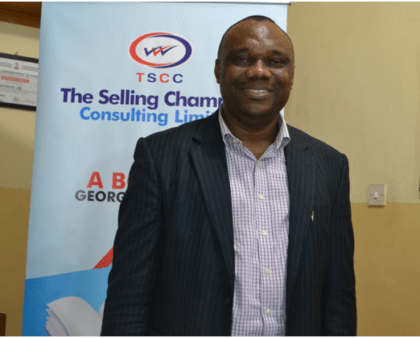
Take yourself to the next level
You may not necessarily be an entrepreneur to work like the owner. You can be an employee and still have commitment like the owner. This is when an employee becomes an “intrapreneur”. This is my idea of ownership mentality. I have used the word “intrapreneur” on several occasions. An “intrapreneur” is an employee who has decided to do things differently in order to achieve extraordinary results. He stands out on the job because of his passion to get things done. He has the mindset of the owner.
The concept of ownership mentality and intrapreneur takes the employee to the top faster. We teach this concept in The Selling Champion Masterclass. We have created champions using this model.
You may be an employee – this is often the case – but you can also develop the attitude of the owner to enable more commitment and interest in the job. You cannot succeed beyond the level of commitment and interest you invest in a venture. When your interest and commitment are high in a project, attaining success becomes easier and faster.
This is one of the secrets of success. Successful people are highly committed to their goals. They pursue their vision passionately. They don’t give up. They fight on. When they fail, they get up and keep fighting. Successful people understand that life is a battlefield. A successful salesman succeeds because of this positive attitude.
No cogent reasons for failure
But the case is different with average sales folks. They give several reasons for failure. They blame their colleagues and their company when they fail to meet expectations. They manufacture excuses for poor performances. These sales folks complain about inadequate sales support tools and whine about activities of competitors. They even grumble about the environment and the weather. They blame everything for poor performance! Yet, none of these is enough reason for failure.
Give your best all the time. The path to greatness has never been easy. The journey to success, whether in sales or any profession, follows a defined path. You just have to keep moving forward and keep doing your best. Your duty is to go for the best result with the few resources you have. This is an attitude you must develop if you want to be exceptional. This is how to be successful.
Giving reasons for failure do not make champions. You must go the extra mile with the little in your hands. This is what people will celebrate. What is news is that you recorded extraordinary result in an unfavourable environment.
Be a committed salesman. Sell as if the product belongs to you. Give the job all you have got because, when you do this, you fly higher and reach your destination faster. Prospects and customers flock around committed individuals. This will be your story when you work with a high sense of commitment. Take ownership of the product and tell your beautiful story.
Take charge
A salesman with the mindset of an employee will not bother to do anything differently to change his performance. He will allow things the way they are. He will continue with the old ways and of course arrive at same old results. Your result will be a usual one if you keep doing the same thing all the time. Nothing will change except you change the way you think and the way you do things.
A salesman with the mindset of a hired person will likely end as an average salesman. He will naturally avoid taking calculated risks because he loves comfort. He loves his comfort zone and will do everything possible to remain there. He is not ready to invest the effort needed to get to the top. He loves his results and the way things are. Changing the current situation of things won’t be necessary because he is not ready to travel the miles required to bring about necessary changes. He just wants things to happen without taking action.
Avoid being too comfortable all the time. Sometimes, you need to deliberately discomfort yourself. This is the mood you create to attain extraordinary result. Dwelling in comfort zone makes folks lazy. Take charge! Take the driver’s seat and navigate your way to success.
In fulfilment of his promise, Dr Samuel Ugwumba, former president, Pharmaceutical Association of Nigeria Students (PANS) has officially joined the race to become a lawmaker

representing Isiala Ngwa North Constituency at the Abia State House of Assembly.
Ugwumba, who bagged a Doctor of Pharmacy (PharmD) from the University of Benin (UNIBEN) disclosed that the move is a fulfillment of his long-cherished aspiration, which he revealed to Pharmanews during an interview as PANS president in 2015.
“Living intentionally is primarily a matter of vision and vision is the hidden factor responsible for our choice making. We make choices every day and our society is shaped by our individual choices.
“Every society, right from the time of creation, has always had its own form of Goliath. Using Nigeria as a case study, everyone knows that our own Goliath is a dearth of leaders at all levels of our national lives,” he said.
According to him, what we have in excess in Nigeria is an abundance of rulers – classical maladministrators, inefficient managers of men and materials, thoughtless occupiers of positions, and people who don’t have the interest of the masses at heart.
Ugwumba who originally wanted to study Aeronautics Engineering before opting for Pharmacy explained that his decision to veer into politics was not something out of the blues since he had always entertained the idea of going into public service for the good of his people.
“But I will state quite frankly that the growing weight of hopelessness and unabated impoverishment is basically the reason why I did not need to wait any longer. It is the home truth that one doesn’t give what one doesn’t have.
“Nigerian rulers do not have what it takes to put smiles on the faces of our people. They neither have the capacity nor competence needed to manage our human and material resources,” he emphasised.
It would be recalled that the 2014 winner of Chief (Sir) E.A. Osadolor Merit Award for Excellence in Leadership once told Pharmanews during the inaugural edition of Sir Atueyi Essay and Debate Competition held at UNIBEN that his eye was set on representing his people at Abia State House of Assembly in five years’ time.
In the said interview, Ugwumba noted that having excelled in various key positions in PANS, SUG and JCI UNIBEN that culminated in his emergence as PANS President, he would definitely continue with rendering altruistic service to his people after graduation.
“People should look out for my campaign posters in 2019 for Abia State House of Assembly, where, with God’s help, we will be making laws that will turn around the fortunes of my state and by extension, the Nigerian society. I plan not to stop there as I believe so much that I will be the first pharmacist and Igbo man to be elected as Nigeria’s president,” he said.
On how he fell in love with politics, Ugwumba credited a certain Ugochukwu Youngbill Unachukwu who was then a member of UNIBEN Students Union Government (SUG) parliament, adding that sharing same hostel space brought them together.
“We became very close. He used to take me to some of his political meetings and I believe that was when my interest in politics was kindled. Consequently, I became a parliamentarian in my faculty – PANS Congress – after which I went up to SUG Parliament.
“I had the desire to run for SUG Presidency but was unduly disqualified, courtesy of the ethnocentric politics embedded in the system which seemingly favours people with Bini ancestry. So all the ideas I had birthed during my SUG involvements were test-run when the pharmacy students gave me the mandate to become their president,” he said.
Explaining his reason for seeking to be a lawmaker, the pharmacist disclosed that he hopes to use his influence to better the lot of Pharmacy.
While describing the practice as a beautiful profession, the 2016 UNIBEN Pharmacy graduate declared that it is unfortunate that it is largely confined in Nigeria because it has continued to be pummeled from all fronts due largely to pharmacists’ apathy to weightier matters like politics.
“A beautiful profession has been battered by our inability to add the most essential positioning power of politics. Instead, the dream of many pharmacists, both old and young, is to become the PSN President or be among the PSN national machinery to continue to lord it over their colleagues and engage in endless banalities.
“If only Nigerian pharmacists could see the harm we have done to ourselves by our shocking inability to rise above internal pharma-politics and deploy our expertise in service to our communities, states and Nigeria at large, we would be halfway close to our solutions,” he reiterated.
Shedding light on the challenges ahead, the former PANS president explained that the job of a legislator is three-fold, namely lawmaking, effective constituency representation, and oversight functions.
In contesting for the House of Assembly ticket for his constituency, Ugwumba pledged to ensure adequate representation of his people at the state level, look into the spirit and letters of the numerous laws with a view to renegotiating those that don’t tally with current realities, while instituting those that can help drive the engine of development faster.
“Morever, as someone who wants to become president of Nigeria in 2034, I felt that the best place to begin my political journey is the House of Assembly so that I can effectively serve my people, build my political testimonial and have a platform to sell my ideas for a better Nigeria.
“Also, being in the House will afford me the rarest opportunities to serve as the voice of conscience to other political leaders who might have joined politics with the sole purpose of enriching themselves to the detriment of the people,” he remarked.
Ugwumba’s past leadership antecedent included being a past president of Junior Chamber International (JCI), UNIBEN Chapter; project director, Anti-Drug Misuse And Abuse Programme (ADMAP); project director, Rescue The Environment Programme (RESTEP); past president, PANS (UNIBEN Chapter); Initiator, Sir Ifeanyi Atueyi National Essay and Debating Competitions for Pharmacy Students and past public relations officer, PANS UNIBEN Chapter.
Others were constituency leader: PANS Supreme Congress, UNIBEN (2011); assistant editor, Pharmaworld Health Magazine of Pharmaceutical Association of Nigeria Students (PANS), UNIBEN (2012-2013); secretary, House Committee on Students’ Hostel Matters, Students’ Union Parliament (SUG), UNIBEN (2011-2012); member, Editorial Committee of The Parrot; member, The Compass Magazines of Students’ Union Government, UNIBEN (2011-2012) and secretary general, National Association of Abia State Students, UNIBEN Chapter (2010).
Some of his honours and awards include Dean/Faculty Board of Studies’ Letter of Commendation for Transformational Leadership (2015); Agbami Medical And Engineering Professionals Scholarship Award (2011-2015); Chief (Sir) E.A. Osadolor Merit Award for Excellence in Leadership (2014) and Overall Best Graduating Student’s Prize, Standard Comprehensive High school, Aba (2006).
In the pre-antibiotic era, small cuts or mild infections killed many. In the 20th century, the average life expectancy was below 40 worldwide. Those who got infected would have ridiculously high fever, chills, organ failure and then death. Most people in that era didn’t die of hypertension or diabetes; they didn’t live that long to acquire such – they died from knife wounds and gunshot wounds during duels or at war.
This all changed dramatically with the introduction of antibiotics by Alexander Fleming in 1942 which changed everything medically. Antibiotics are a type of antimicrobial drug used in the treatment and prevention of bacterial infections.
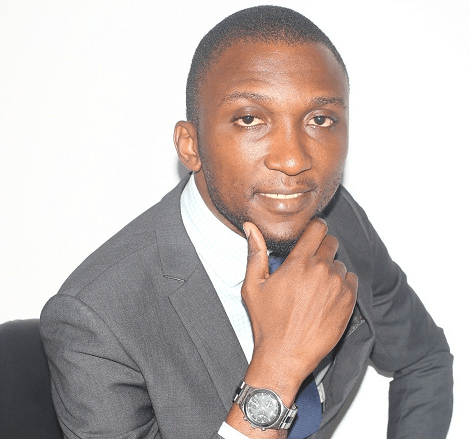
Fast forward many years after Fleming’s discovery and we are on the verge of an epidemic called “antibiotic resistance”. Infectious diseases are gradually getting ways to survive in their hosts (humans), gradually pushing into a dangerous situation where only newer generation antibiotics are effective. These brands are usually expensive and not readily available to the populace.
Actually, this cat-and-mouse relationship between bacteria and pharmaceuticals has been on for many years. Develop a new antibiotic, the bacteria get resistant to the antibiotic and the drug no longer is effective. This, however, is a man-made problem, as professionals, pharma companies and patients all have roles to play in managing this scourge.
Causative factors
A myriad of issues contribute to the antibiotic resistance plague. Fortunately, they are preventable, they include:
Wrong diagnosis
Poor compliance
Counterfeit medicines
Poor compliance
Drug abuse
Physicians and pharmacists can play significant roles in controlling antibiotics use, as they prescribe medicines for and counsel patients respectively. In America, for example, 45 per cent of prescribed antibiotics are unnecessary. In Nigeria the figures aren’t available, antibiotics are taken as over-the-counter medications in some pharmacies (especially patent medicine stores), hawked by drug merchants and sold indiscriminately in open drug markets. These sickening acts might culminate in a terrifying post-antibiotic era if proper sensitisation care is not taken.
Compliance is key to treating bacterial infections as wrong or incomplete use can trigger the resistance bug. For example, antibiotics to be used every eight hours, must be taken so, as this will ensure that the maximum dose needed to kill the bacteria is always available. Avoid using double the dose when a particular dose is forgotten or missed. It is ideal to consult a pharmacist in case of a missed dose. You may be provided with portable pill boxes to ensure you don’t miss any dose.
Counterfeit or adulterated medicines lead to bad therapeutic outcomes, which worsen antibiotic resistance. Patients must patronise registered pharmacies to get their medicines to ensure they do not fall victim of this epidemic.
Owners of farm animals add antibiotics into their feed to help prevent infections and illness. We eventually eat this meat and further add to flaming issue of resistance.
Taking precautions
Penicillin was first introduced in 1943 but became resistant in 1945. Bacteria develops resistance so quickly that we all must ensure we don’t get to the point where out of over 100 antibiotics available in the market, only two will work. This would be very costly.
The constant development of resistance by bacteria has led to massive investment by pharmaceutical companies to curb this menace. To ensure these discoveries and investments aren’t futile, we must control our indiscriminate use of antibiotics as individuals, on a national and global level. Lawmakers must formulate laws against illegal prescribing and dispensing of antibiotics.
Pharmacists must resist the drive to dispense or sell antibiotics without proper authorisations or prescriptions. Prescribers must ascertain the need to give antibiotics after proper tests have been carried out.
Now that you know, you must act to stamp out antibiotic resistance in our society, nation and world at large.
By Pharm. Ayodeji Oni
(Freelancing for Advantage Health Africa)
Professor Dame Elizabeth Nneka Anionwu is a British-born nurse, health expert, counsellor, lecturer and medical professor of Irish and Nigerian descent. A highly celebrated and internationally renowned emeritus professor of nursing, she is widely known for her contributions in the opening of the first sickle cell and thalassemia counselling centre in the UK in 1979. This ground-breaking sickle cell service in London has led to babies nationally being screened at birth in the UK. Also, her relentless efforts to ensure that people affected by sickle cell disease and thalassemia get the support they need has indeed touched many lives.
Professor Anionwu has held senior executive positions in various organisations and received many awards and recognitions for her outstanding achievements and contributions to nursing practice in the UK. One of her notable recognitions was the award of Dame Commander of the Order of the British Empire, conferred on her by Queen Elizabeth II in 2017 for her services and contributions to nursing practice and the establishment of Mary Seacole Statue Appeal. She is also a Fellow of the Queen’s Nursing Institute (FQNI).
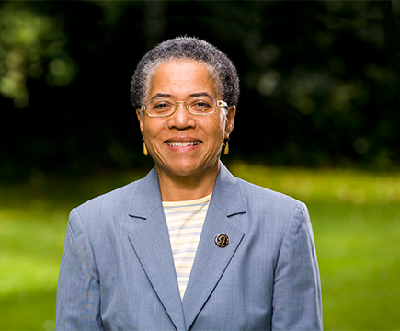
Throughout the course of her career, she has authored several books, as well as articles, published in many journals. She co-authored “The Politics of Sickle Cell & Thalassaemia” (2001) with Dr Karl Atkin. She also wrote “A Short History of Mary Seacole: a Resource for Nurse and Students” (2005). Her astonishing life’s story was detailed in her memoir titled “Mixed Blessing from a Cambridge Union”, published in 2016.
Family and background
Elizabeth Anionwu rose from a challenging childhood to the highest echelon of the nursing profession, validating the saying of C.S Lewis that adversity prepares a person for an extraordinary destiny. No one would have imagined that her life would turn out so well with her humble background and the challenges she faced early in life. The rejection and stigma from her family and the society because of her skin colour and the stereotyping for being mixed race in a society which routinely undervalued black people’s ability constituted a major challenge for her while while growing up. But she chose to make a mark with her life against all odds.
Prof. Anionwu was born Elizabeth Mary Furlong in Birmingham, UK on July 2, 1947. Her parents Mary Furlong, from a middle class Irish family and Lawrence Odiatu Victor Anionwu, a Nigerian, met as students at Cambridge but never married. Her mother, Mary Furlong was very brilliant and excelled academically. She won a scholarship to study Classics at Cambridge University and she was in her second year when she became pregnant by Lawrence Anionwu who was a Law student at Trinity Hall, Cambridge, at that time.
Mary Furlong’s devout catholic family were disconcerted by the news of her pregnancy. This devastation further intensified at the birth of the mixed race, “illegitimate” child. Elizabeth mother’s hopes of a promising academic career was dashed as she had to quit school and find a job, so she could provide a home for her daughter and herself. The rejection by her family further put intense strain on her relationship with Elizabeth’s father and both soon parted ways.
Elizabeth spent nine of her early years at the Nazareth House convent in Birmingham where she had a difficult and an unstable upbringing. As a child, she was constantly on the move and didn’t have the opportunity to settle and experience the care and love of family where she could build up her confidence.
Meeting her father
Elizabeth grew up not knowing her father. Her African identity was a missing part of her that remained elusive throughout her childhood and teenage years until few weeks before her 25th birthday. She had written to her mother three months earlier asking for information about her father but she was advised not to search for him. However, she was told that he was from Onitsha in south-eastern Nigeria and that he had returned to Africa after qualifying as a barrister and married a Nigerian woman.
Unable to give up the idea of ever knowing her father, she asked a friend who taught law at the university for advice. As fate would have it, the friend called two days later to inform her he had found her father, who coincidentally, was living in London at that time. She called him on the phone immediately, and consequently, met him the next day.
Meeting her father and getting to know her Nigerian roots was a major landmark in Elizabeth Anionwu’s life. After travelling to Nigeria for the first time, she grew to love the warmth and ease of her Nigerian family. They accepted her as she was and encouraged her to take her father’s name which she did with her mother’s approval.
Career
It is a beautiful thing when career and passion come together. Just like every nurse drawn into the noble profession because of their desire to care, to serve and help others, Elizabeth Anionwu’s passion and motivation to become a nurse was inspired by the care she received from a nun who cared for her eczema in a sensitive and expert manner when she was aged four. At the age of 16, she started to work for the National Health Service as a school nurse assistant in Wolverhampton.
Her father also played a major role in shaping her career path. He was a barrister and former ambassador of Nigeria to Italy. His love for education made him to encourage her to become a tutor. She applied for a course and got a scholarship. Later on, she travelled to the United States to study counselling for sickle cell and thalassemia, because centres and courses were not available in the UK at that time.
In 1979 Elizabeth Anionwu worked with Dr Milica Brozovic to create the first UK Sickle Cell and Thalassemia counselling and screening centre in Brent. She was the first ever UK sickle cell/thalassaemia nurse counsellor and appointed the Head of the Centre from 1979 to 1990.
In 1988 Elizabeth Anionwu was awarded a PhD from the Institute of Education, University College London (UCL). In 1990, with the help of Professor Marcus Pembrey, she taught a course at the University College, London, that was for NHS staff members who worked with communities affected or were at risk of sickle cell disease and cystic fibrosis. She advanced academically to the position of a senior lecturer in community genetic counselling at the Institute of Child Health, University College London. In 1997, Elizabeth Anionwu was appointed as Dean of the School of Adult Nursing and Professor of Nursing at the University of West London. In 1999, she established the Mary Seacole Centre for Nursing Practice and was Head of the institution until her retirement in 2007. The university then honoured her with the award of Emeritus Professor of Nursing.
Awards and recognitions
Prof. Anionwu was honoured with a Damehood (DBE) in the 2017 Queen’s New Year’s Honours List for her services to nursing and her role in the establishment of Mary Seacole Statue Appeal. The Queen’s Nursing Institute awarded her a Fellowship (FQNI) in October 2017. In 2001 she was awarded a Commander of the British Empire (CBE) for services to nursing. In 2004, she was presented with the Royal College of Nursing Fellowship (FRCN) for her work in the development of nurse-led sickle cell and thalassaemia counselling services and education and leadership in transcultural nursing. In 2010, she was inducted into the Nursing Times Nursing Hall of Fame for services to the Development of nurse-led services and in 2016 was presented with the Chief Nursing Officers’ Award for Lifetime Achievement at the ‘Nursing Times’ Awards Ceremony.
PharmAccess Foundation Nigeria has partnered with the Nigerian Healthcare Excellence Award (NHEA) to recognize and celebrate innovative healthcare service providers in Nigeria, during the 2018 award ceremonies, taking place in Lagos on 22 June 2018 by sponsoring the award category PharmAccess Innovative Healthcare Service Provider of the Year.
According to Njide Ndili, PharmAccess Nigeria country director, “This is our third consecutive year of partnership with NHEA but our second year as the sponsor of the innovative healthcare service provider award category. Our motivation supports our core objectives, which is to promote innovation that improves access and efficiency in service delivery at scale, leveraging technology at an affordable cost without bias to your location, economic status or income level.”
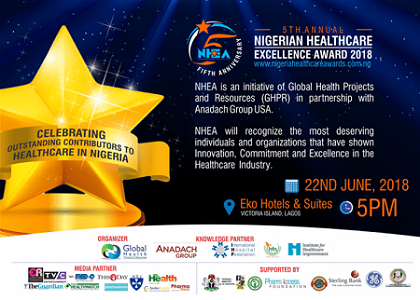
Dr. Shola Alabi, NHEA project coordinator, who spoke on this development says, “NHEA is Nigeria’s leading healthcare platform that recognizes excellence and innovation in the sector. We value our partnership with PharmAccess. Their desire for continuous improvement in the sector deserves special commendation.”
SaferMom won the NHEA 2017 PharmAccess Innovative Healthcare Service Provider of the Year. SaferMom empowers pregnant and new mothers to make informed health decisions via the use of mobile technology.
Nominations for the 5th edition of NHEA 2018 is ongoing and stakeholders can visit www.nigeriahealthawards.com.ng to either make their nominations online or download the nomination form.
Winners of the various categories will be honoured on Friday, 22 June 2018 at Eko Hotels & Suites, Lagos. Nominations will close on May 25, 2018 before the commencement of online voting to enable the award jury select the winners of the various categories.
23 awards and recognitions will be presented at the ceremony under four main categories; Special Awards, Healthcare Delivery Services, Biomedical Technology and Pharmaceuticals.
PharmAccess Foundation mobilizes public and private sector resources for the benefit of healthcare providers and patients through clinical standards and quality improvements, loans for healthcare providers, health insurance, health innovations and operational research. Our goal is to provide technical assistance to states seeking to operationalize their mandatory health insurance law; deepen engagements with federal and state Ministries of Health and primary healthcare development agencies to scale SafeCare methodology in Nigeria; leverage on the digital and mobile technology innovations to achieve scale; work with the state government to design and roll out the Access to Finance Scheme for Health SMEs under a Public-Private Partnership (PPP) arrangement with a vision to increase access to affordable and better healthcare.
NHEA is organised by Global Health Project and Resources (GHPR) in collaboration with Anadach Group, USA.
The zonal coordinator, Association of Community Pharmacists of Nigeria (ACPN), Eti-Osa Zone, Pharm. George Okon, has vehemently condemned the recent transition exercise that saw the emergence of new executives for ACPN-Lagos, saying the process was fraught with irregularities.
Speaking with Pharmanews in an exclusive interview recently, Pharm. Okon, who is the managing director and chief executive officer of Dlightsom Mount Pharmacy Limited, Ajah, Lagos, equally tasked the newly elected executives to come up with a by-laws for the association so as to prevent a recurrence of the controversies that trailed the last elections. Excerpts:
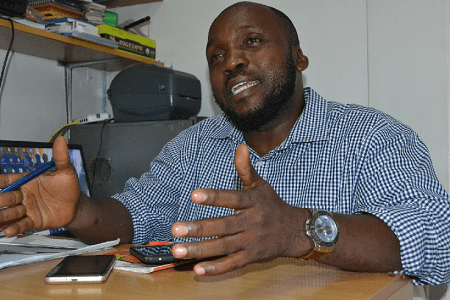
What are your thoughts on the recent transition exercise and emergence of new executives in ACPN-Lagos?
I believe the just concluded election was flawed because ACPN-Lagos has been operating without by-laws. Before now, it had always been a selection process, where people were selected into the executive body. I was an aspirant for the state chairmanship position but was disqualified based on reasons that were unclear to me and those in my camp.
What exact reasons were given for the disqualification?
The executive body at that time said that, based on their own guidelines, I could not contest for the state chairmanship position because I was not a member of the existing executive body. They also said that I should have served in an executive capacity for at least two years before I could be eligible to run for the state chairmanship position.
But what has been happening over time is like a successive government where at the end of any tenure, the vice chairman takes over as chairman and the general secretary takes over as the vice chairman and on and on. So, I think that they were displeased with the fact that I was coming out of “nowhere” to contest and I feel that that is not professional.
Despite this unwritten arrangement, you still decided to contest. Why?
Many community pharmacists in Lagos are unhappy with the leadership of ACPN-Lagos. This is the reason why you do not see them in meetings and other functions. The only thing that makes community pharmacists feel that they are part of the ACPN is the annual dues that they pay, and that is because it is compulsory; without it, you can’t get your license and practice.
The ACPN state secretariat is a shadow of itself. And everything boils down to leadership. The executive body in times past has claimed to have a constitution. However, since we are a state chapter, we cannot have a constitution as we are under a national body. The national body has a constitution and there should be by-laws at the state level, but we do not have by-laws in ACPN Lagos State. And this is a shame.
Now that the election has been held and new executives have come, what is the way forward?
Being the state chairman of ACPN is not a “do or die” affair. I just wanted to go there and render service. I feel that we should stop complaining as a body and look to proffering solutions instead.
If you had contested, would you have won?
Yes, most definitely. Community pharmacists are tired of the way things are and they want someone fresh with fresh ideas. They know that I would have won and that’s why they disqualified me from contesting.
ective leadership that you alleged is going on in the ACPN?
I have decided to take up this struggle. I wrote a petition to the National Chairman of ACPN. We’ve also moved a motion at the last Annual General Meeting for the executive body to inaugurate a constitutional review committee that would come up with by-laws for ACPN Lagos and everybody will be involved in this process. We’ve been able to get this done. We are also showing keen interest in the selection of people that make up this committee.
What would you say are necessary areas that the leadership needs to improve on?
There is a lot that needs to be done. ACPN-Lagos does not even have a database of all the pharmacists in Lagos State. Without data, we can achieve nothing. Last year, the executives did pharma-mapping and this was a good step in the right direction. However, without the database that mapping will not be useful.
Data has been a major challenge, when you don’t know the number of pharmacists you have under you, you won’t be able to do much. The previous executives have done their best, but you cannot give what you don’t have. ACPN Lagos State should have been the pacesetters amongst other states but we are not fulfilling that role. We need to do more, we need to get organised.
What are your thoughts on the plan of the federal government to commence the implementation of National Drug Distribution Guidelines by the end of January, 2019?
It’s a good one; at least we’ve got a date for now. However, I doubt that date because that is quite close to the elections and the ruling government will not want anything that will jeopardise their chances at the elections. But, I would give the government the benefit of the doubt, hoping that they have the political will to pull this through, and if the government does then kudos to them.
The guidelines will be helpful in building an organised channel for drug distribution in the country. One of the core reasons for rampant drug abuse is the porous drug distribution system that we have.
On the issue of drug abuse, what do you think the community pharmacist should do?
Community pharmacists ought to create awareness, using different platforms, including the social media, print and television. And the government needs to step up in tackling this problem. With the large quantity of codeine in circulation, who is approving these drugs? It’s definitely not the community pharmacists.
If the government puts in their political will, then they can actually control this menace. This year, community pharmacists plan to celebrate the World Drug Abuse Day in June by going to schools to create awareness on drug abuse and its many dangers to health, and the society at large.

Debt collection is as old as man and is bedevilled by all kinds of inhuman practices – threats, terror, ritual, thuggery etc – which made the profession so ignoble and unattractive to professional-minded career seekers.
In the event of improvement in human civilisation and developments in human business transactions, it is also important to approach debt collection in a way that makes it a profession and as such necessitate the mastery of the art involved. This actually led to the development of a curriculum in debt collection/recovery practices with some guiding rules.
Debt collection and debt recovery appear to be synonyms but there is a thin line of divide between them. Debt collection involves all measures employed to get the money owed to a creditor by a late-paying borrower. In most cases, when a debt is still at the lay payment stage, the creditors manage it themselves.
Debt recovery, on the other hand, is the pursuit and collection of a debt after it has been written off in the creditor’s accounts. As such, such monies are no longer part of the creditor’s account receivables, but that doesn’t necessarily mean that the creditor has forfeited the money. In my next article, I will be explaining in detail what it implies when a debt is said to be written off.
Debt recovery involves aged debts which the creditor could not make headway in its collection. The emphasis in debt collection is to get back the sum of what is owed that has not been paid, while the emphasis in debt recovery is to collect the sum owed and also maintain the relationship between the creditor and the debtor. The ultimate aim of debt recovery is to collect what is owed, as well as restore the stale relationship between the creditor and the debtor.
The difference between debt collection and debt recovery also necessitates the difference in the approach employed in ensuring that what is owed is collected. A debt collection agent is one who goes after money owed an organisation or individual by a debtor who has accepted indebtedness to the sum in question but has delayed in fulfilling the contractual agreement – payment obligations.
Beyond debt collection
The debt collector’s interest is in the sum being owed and nothing else. In most cases, he pays little or no attention to managing the relationship between the creditor and the debtor. His approach to debt collection is more like that of the tax masters. In most cases also, they do not understudy the given brief thoroughly before swinging into action. For the debt collector, what constitutes the brief may be the statement of indebtedness from the creditor and nothing more.
The debt recovery agent however is one that goes after the money owed by a debtor who may not have accepted indebtedness, may have been at large, may have given some excuses as to why the payment has not been made, or who may be having some financial difficulty. Thus, the debt recovery agent meets two types of debtors – the “I will not pay” and the “I cannot pay” debtors.
As earlier noted, a debt recovery agent doesn’t only have his eyes on the sum due which has not been collected but also on ensuring that the relationship of the creditor and the debtor is restored. In most cases, the amount being owed is disputed and the debt recovery agent will have to go back and forth with the analysis of account statements, analysing every detail of the transactions until the grey areas are revealed and reconciled. In some other cases, he will have to deal with fixing the error caused by the approach the creditor employed earlier in an effort to recover the debt.
For the debt recovery agent, no debt recovery brief is complete until the debtor has told his own side of the debt story. Also, if he ends up collecting the money without restoring the stalled relationship between the creditor and the debtor, his job is half executed.
While the debt collection agent goes for the money owed, picks it up, drops it with the creditor and walks after pocketing his commission, the debt recovery agent pays attention to all details both from the creditor and the debtor. He goes back and forth, vacillating between the creditor and the debtor until both come to a mutual understanding regarding the debt. His collection starts at that point when the debtor makes the payment “willingly”.
Unlike the debt collection agent, the debt recovery agent also analyses the entire situation and advises the creditor on proactive steps to take to forestall future occurrence of bad debt. The debt recovery agent is relationship-minded and produces better results for business organisations on the long run.
Bottlenecks
In most cases also, because the debt recovery agent is dealing with a debt which the organisation doesn’t consider to be part of its cash flow anymore, he suffers some delays and sometimes non-responsiveness from the personnel of the organisation that should be feeding him with information.
At some point, if the claims of the debtor become so difficult for the creditor to refute, due to inappropriate record keepings, the organisation may abandon the debt recovery agent with such statement as, “We will look into our records and get back to you”. And in most cases that becomes the end of that debt chasing exercise. At this point, it becomes obvious that the creditor doesn’t have the appropriate records to refute the debtor claims.
This is a common occurrence in the Nigerian pharmaceutical industry. When it gets to this point, the debt recovery agent is caught at a standstill without getting paid for all the efforts he has put in so far simply because there was no collection.
As a debt recovery agent, it is very important that you evaluate the brief appropriately to have a good understanding of what you are up against because it is a common experience for “the hunter to be hunted” (the creditor becomes the debtor) in the game of debt chasing. Once it gets to that stage, the creditor goes silent under the guise that he will cross-check things and get back to the debt recovery agent.
This jungle scene of the hunter being hunted is prevalent in the pharmaceutical industry also because the prospective debtors (sales representatives or serviced customers) know where the loopholes are in operational system of the company. Thus, when approached by the debt collection /recovery agent, they hem their web of claims around the loophole to form an intricate maze which the organization cannot spare the resources of time to unravel. The result is a debtor who claims that the creditor is indebted to him because the creditor cannot refute his claims.
While the debt collection agent gets duly paid for his collection job, the debt recovery agent is always underpaid for the immeasurable ways he contributes to the growth of a business. For me, any debt recovery effort that jeopardises the relationship between the debtor and the creditor did not achieve its aim in totality.
So, as a creditor, choose which to engage. If you value the money and the relationship with the debtor, engage the debt recovery agent but if you value only the money, you may engage the debt collection agent.
Next time, if you think continuity of your business, if you are thinking long term, if you need proactive approach to bad debt occurrence, engage a debt recovery agent not a mere debt collection agent. Debt recovery agents are better referred to as debt recovery consultants.
By Frederick Ezenwa Ibeako
In my new book, “The Seven Secrets of Amazing Health”, I shared some fundamental principles that have been tested and confirmed for ages to guarantee great health and its benefits. This mini book is my own contribution to the United Nations’ Sustainable Development Goal 3, target 4, which states: “ensure healthy lives and promote well-being for all ages, by 2030, reduce by one third, premature mortality from non-communicable diseases through prevention and treatment and promote mental health and wellbeing.”

The seven secrets cover the following:
The true meaning of health
According to the World Health Organisation (WHO), health is defined as “a complete state of physical, emotional, mental and social well-being, and not merely the absence of disease or infirmity.” This powerful definition has survived over a century and it is generally regarded as the most acceptable definition of health in the world. From the above definition, physical wellness is just one out of the other parameters to conclude that someone is healthy. For an individual to be certified truly healthy, their physical, emotional, social and mental well-being must be in good state.
The dimensions of wellness
Wellness is defined, according to The National Wellness Institute, as a “conscious, self-directed and evolving process of achieving full potential.” The eight dimensions of wellness can be represented with the acronym, POISE-F.
P – Physical wellness
O – Occupational wellness
I – Intellectual wellness
S – Social and spiritual wellness
E – Emotional and environmental wellness
F – Financial wellness
Know your numbers
What are your numbers? I’m not talking about your phone numbers or account numbers. What are your health numbers – your Blood Pressure (BP), Blood Glucose Level (BGL), Body Mass Index (BMI) and other vital numbers that depict your health status? A Health conscious person is someone who is always aware of his vitals because he often checks his health status. A health careless person is someone who doesn’t care about his health status, thus, he doesn’t have current information about his health vitals.
Respect your body
You have only one body – no spare parts, no market to buy another one, no “tokunbo” or “fairly used”. It is therefore pertinent for you to respect your body. Taking good care of your body has a lot to do with healthy habits. Having a strong and sound body is not an option, it is a must. It can never be achieved by a lacklustre attitude but only through a conscious and continuous process of healthcare. As we grow older, our body is aging. The kernel of the matter is that your body houses your mind and spirit. And when the body is in trouble, then the mind and spirit cannot function optimally. Hence, there is a need to keep taking optimum care of your body.
Honour your mind
Powerful and mighty is the human mind. It can build or destroy. The human mind is that which enables a being to have subjective awareness and intentionality towards his environment, to perceive and respond to stimuli with some kind of urgency, and to have consciousness including thinking and feeling. The state of your mind has a stupendous effect on the state of your health. Great health starts from being in the right frame of mind.
Savour your spirit
Spiritual health is germane in experiencing an amazing health. We all are spiritual beings. According to Maslow’s hierarchy of needs, the highest human need out of all his needs is self-actualisation (fulfilments). This can be achieved through a pattern of living which will focus on two spiritual needs
Continuous growth (achieving our full potential).
The need to contribute beyond ourselves in a meaningful way (to make a difference in the lives of others).
In other words, for our spiritual health, we need to keep growing as individuals in order to achieve our full potential and be able to make a difference in the lives of others. Your spirituality feeds on fulfilment.
Age with grace
Every day, our body is getting old naturally, our mind is growing constantly, and our spirit is looking out for fulfilment regularly. Every day, we are taking a step closer to our ultimate end. The person born is definitely the person dying.
Now you have the seven secrets of Amazing Health at your fingertips. The more you apply them, the better you will fall in love with the new life and the new you, you are experiencing.
ACTION PLAN: Master the seven secrets of amazing health. Know your numbers. Strive towards complete health. Respect your body. Honour your mind. Savour your spirit.
AFFIRMATION: I am so happy and grateful now that I have mastered the seven secrets of amazing health. I am blessed and highly favoured.
You can download the FREE copy of The Seven Secrets of Amazing Health at www.sesankareemcom.ng
The World Health Organisation (WHO) on 7 April marked its 70th anniversary and rightly rolled out drums to celebrate seven decades of spearheading global efforts to rid the world of deadly diseases. The WHO, it would be recalled, succeeded the League of Nations’ Health Organisation and its establishment was approved by the United Nations Conference in San Francisco, USA, in 1945.
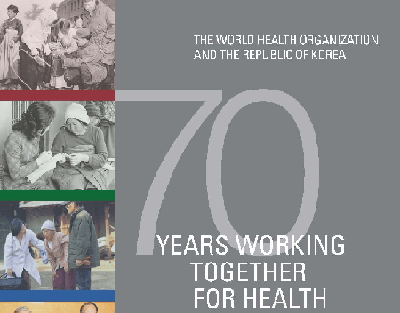
The global health body indeed has ample reasons to celebrate. Since its establishment, it has recorded tremendous success in improving life expectancy and taming diseases globally. Its first major accomplishment was the eradication of smallpox, which had long been considered the deadliest and most persistent human infectious disease. Since the elimination of smallpox in 1977, the organisation has turned its attention to eradicating other debilitating tropical diseases like elephantiasis, guinea worm, mother-to-child transmission of HIV and syphilis.
In addition, WHO has been a key player in promoting worldwide disease prevention and health programmes. It has been impressively proactive and innovative in supporting, encouraging and working with partners in health research and gathering data on global health conditions and needs, particularly in developing countries. It has also engaged in collaborations that have seen to the production of vaccines for serious health conditions like Ebola, Polio and most recently malaria.
While we commend the WHO for these and many more remarkable contributions to global health, we equally urge it to do more by reviewing its past and present approaches to health challenges, especially in developing countries, with the ultimate aim of devising more efficient strategies towards achieving its objectives. This is not the time to relent; it is a time to consolidate on its gains over the years and proactively tackle emerging challenges in the global health landscape.
It is also noteworthy that on 7 April when WHO marked its 70th anniversary, the organisation equally commemorated the World Health Day, a day set aside annually to call global attention to major health issues. It was therefore quite apt and relevant that the theme for this year was “Universal Health Coverage: Everyone, Everywhere.”
It is quite commendable that WHO with this choice of theme decided to focus on one of its founding principles which states that access to quality standard health care is a “fundamental human right for every human being without distinction of race, religion, political belief, economic or social condition.”
This is surely the way to go. The WHO should be at the vanguard of promoting and tasking nations to embrace the concept of Universal Health Coverage. It is our belief that to make the needed progress in better healthcare for people and achieve the Sustainable Development Goal (SDG) of ensuring “healthy lives and promotng wellbeing for all ages”, Universal Health Coverage must become the norm in all nations of the world.
The WHO must also do more to improve the global preparedness and control of epidemics, especially in developing countries with weak health systems. The disjointed reactions to recent epidemics like Ebola in African countries should not be happening in this age.
It is imperative to have global pragmatic strategies in place that can help prevent disease outbreaks that constantly turn into epidemics, by being able to respond faster and with tact to health and humanitarian challenges.
It is also commendable that WHO has recognised the increasing incidences of non-communicable diseases like cancer, heart disease and diabetes which are said to account for almost 70 per cent of all deaths. While not neglecting communicable diseases, the WHO should equally focus more on global health campaign to tackle this new reality in the world.
Pharm. Adebayo Afon is the managing director and chief executive officer of Safco Mega Solutions, a pharmaceutical wholesale company that supplies branded generics and over-the-counter pharmaceuticals to a wide range of customers. He is also the owner of Afonches Pharmacy Limited, a chain pharmacy outlet with eight branches around Lekki and Ajah areas of Lagos State.
Born in the ancient city of Ogbomosho, Oyo State, Nigeria, Afon bagged a Bachelor of Pharmacy degree from the University of Benin (UNIBEN) in 2000. He began his career at the Federal Neuro-Psychiatric Hospital, Yaba, Lagos, as an intern between the year 2002 and 2003, which afforded him the opportunity to obtain valuable experience in pharmaceutical care services, under the supervision of seasoned pharmacists and healthcare practitioners.
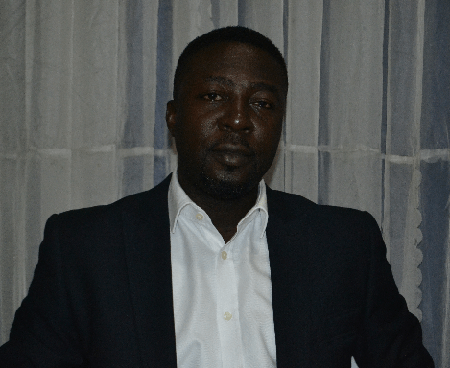
As a prudent son of his late father, Pharm. Solomon Adegboyega Afon, the junior Afon successfully managed his father’s company, Safco Chemist Limited, located in Benin City, Edo State, for 18 years, before it was liquidated and Afonches Pharmacy Limited, a retail pharmacy which has now grown to a chain pharmacy, was established in the year 2004.
Afon, an entrepreneur par excellence, with the passion for diligence and excellence, forged ahead to establish Safco Mega Solutions, a pharmaceuticals and healthcare wholesale distribution company in April 2016, a date which coincided with the 30th anniversary of the death of his father and founder of the defunct Safco Chemist.
A passionate practitioner with special interest in effective and efficient drug distribution system in the country, Afon went into wholesale drug distribution with the aim of correcting the anomaly of ineffective supply chain system, traceable to monopolistic pricing system, delay in delivery, product hoarding, insufficiency of products and stiff market conditions imposed on pharmaceutical retailers in Nigeria, especially those in Lagos State.
To further boost his drive as a result-driven individual with demonstrated skills in establishing and expanding new frontiers through in-depth market research and aggressive sales strategy, Afon has attended several local and international conferences, including the International Pharmaceutical Federation Conference (FIP), held in Dublin, Ireland in 2013, and several other local conferences and seminars.
Afon is a committed and active member of the Pharmaceutical Society of Nigeria (PSN), Association of Community Pharmacists of Nigeria (ACPN), as well as other numerous professional associations. He is the incumbent vice chairman, ACPN, Eti-Osa Zone, and has been commended for his activities towards the progress of the association in Lagos State and beyond.
Pharm. Afon is happily married with children.
At birth God gives everyone gifts to enable them fulfill the purpose for their creation. No one is without one type of gift or the other. Ephesians 4:7 says, “But to each one of us grace has been given as Christ apportioned it.” However, His grace does us no good at all until we accept it and act on it.
Success in life heavily depends on full exploitation of your God-given gifts. “A man’s gift makes room for him and brings him before great men” (Proverbs 18:16). You were designed to be known by your gift. It is your gift that makes you perceived as an important person. It is the source of your significance.
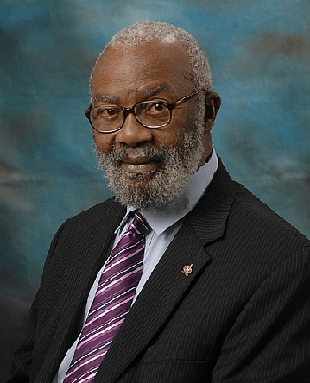
Do you want your life to have a meaning? Discover your gift and work on it. If you want to find real fulfilment, purpose and contentment in your work, operate in your area of gift. You cannot fulfill your life purpose without minding your own gift.
Your gift makes you unique and original and confers the seed of greatness on you. That is why you cannot compare yourself with any other person. Those who do so are foolish (2 Corinthians 2:10). You are a special creation. The only person you should strive to be is yourself. God wants you to be yourself and not any other person.
The best education is one that develops your gift and takes you to your destiny. This is the type of education you need to covet. General education by itself is not actually key to your success. This is why even some PhD holders end up frustrated and unfulfilled. If you are educated but have not developed your talent, you are likely to be struggling, depressed, tired and frustrated.
Some university dropouts have pursued their talents outside the formal education system and acquired wealth and become influential. There are brilliant and intelligent young people who find themselves in wrong places of work. The workplaces are good but the problem is that people there doing things they are not designed to do.
Anyone who discovers his gift and develops it will be needed and his services appreciated and rewarded. Proverbs 22:29 says, “Do you see a man skilled in his work? He will stand before kings; he will not stand before obscure men.”
Young people planning their careers or professions should not base their choice on the one that brings greatest monetary reward or prestige. They should endeavour to discover what they were born to do. There is a purpose for their creation and a successful life is one that fulfills that purpose. Parents, guardians and counsellors have an important role in this aspect.
In discovering your gift, ask the Giver of the gift for help. He is glorified when you discover and optimally use it to serve and bless others. To discover your gift, try your hand at whatever you enjoy doing. Whatever your hand finds to do, do it with all your might (Ecclesiastes 9:10).
Remember that your gifts are not withdrawn from you, even if you don’t value or use them. Many of us receive presents and just lock them up somewhere in the house or office. You may keep them unused until they become obsolete and useless. The giver of the present will not question you on its usage. He has no more business with it once given out.
God’s gifts are never recalled. “For God’s gifts and His call are irrevocable” (Romans 11:29, Bible Hub). You can allow your gift to be latent or dormant in you or even misuse it but God will not withdraw it. However, you must account for it at the right time.
There are consequences of not discovering, developing and using your gift. Anything not used atrophies. If you park your car for a long time without driving it, some parts will definitely malfunction. In the same way, your life purpose may not be fulfilled and you will not be useful to other people if you don’t discover and use your gift. And since you may not be doing what God has called you to do, you will not honour and please Him. You may not find joy in whatever you are doing. Instead, you experience frustration, tiredness and sickness.
Such a person cannot excel in any particular area but remain a mediocre. Above all, there will be God’s judgement for hiding his talent (Matthew 25:26-30).
Merck Foundation (www.Merck-Foundation.com), the philanthropic arm of Merck KGaA, Germany (www.Merck.com), in partnership with the International Federation of Gynecology and Obstetrics (FIGO), conducted ‘Merck More Than a Mother’ panel at their Regional conference 2018, in Dubai.
Merck Foundation is dedicated to empowering women who suffer discrimination and violence due to their inability to bring children. Merck Foundation is also involved in engaging policymakers to define interventions to improve access to regulated and cost effective Fertility Care in Africa and Developing Countries
Dr. Rasha Kelej, CEO of Merck Foundation stated during the panel discussion, “Through ‘Merck More than a Mother’, we want to bring the healthcare providers, policy makers, academia, women leaders, media, and artists together to define the interventions to break the infertility stigma around women and to build fertility care capacity in Africa and developing countries.”
She further emphasized, “Merck Foundation is dedicated to empowering women who suffer discrimination and violence due to their inability to bring children, by creating the cultural shift to break the infertility stigma at all levels, not only in Africa, but in Asia, Latin America and everywhere it is needed.”
The high-level panel discussion included; Hon. Sarah Opendi, Minister of state of Health, Uganda, Hon. Zuliatu Cooper, Minister of Health and Sanitation, Sierra Leone, Hon. Margaret Mensah-Williams, Chairman of National Council of Namibia, Hon. Dr. Chitalu Chilugya, Minister of Health, Zambia, and the CEO OF Merck Foundation, Dr. Rasha Kelej.
Hon. Dr. Chitalu Chilugya, Minister of Health of Zambia, emphasized, “Infertility is one of the major health problems in Zambia, and it is not only affecting the physical health but also the mental well-being and social status, of childless women. These women often become invisible to the society, and many time they do not want to come in open to seek help because of the social stigma associated with infertility. Together with Merck Foundation, we want to remove the stigma associated with it by creating a cultural shift and building cost-effective fertility care in Zambia.”
During the panel discussion Hon. Margaret Mensah-Williams, Chairman of National Council of Namibia, stressed, “Infertility is profoundly prevalent in sub-Saharan Africa, which is said to have an “infertility belt” wrapped around its center, the infertility rate is much higher in southern Africa. Particularly in Namibia infertility prevalence rates for some ethnic groups is as high as 32 percent, or one-third of all couples attempting to conceive, which is why initiatives like ‘Merck More than a Mother’ are significant for Namibia and we are glad to partner with Merck Foundation for this initiative.”
Hon Zuliatu Cooper, Minister of Health of Sierra Leone emphasized, “Merck Foundation is making history my country, they have trained the first two fertility specialists in Sierra Leone. For the first time, the infertile couple will be treated in their home land. We still need to build the first IVF center to be able to manage complicated cases though.”
Hon. Sarah Opendi, Minister of State of Health, Uganda said, “The journey that Merck Foundation has started is a very special journey that has touched the lives of women who have been forgotten in the communities. It has touched not only women but also the lives of men who have been mistreating their women thinking that infertility is an issue of women, not know that 50% infertility is due to the malefactor. I want to thank Merck Foundation for thinking about these women.”

About ‘Merck More Than a Mother’ campaign;
In many Cultures, childless women suffer discrimination, stigma, and ostracism. Their inability to have children results in great isolation, disinheritance, and assaults. “Merck More Than a Mother” empowers such women through the access to information, health, change of mindsets and economic empowerment.
Merck Foundation provided for more than 50 candidates, three months to six months clinical and practical training for fertility specialists and embryologists in more than 17 countries across Africa and Asia.
Merck Foundation is making history in many African countries where they never had fertility specialists or specialized clinics before ‘Merck More Than a Mother’ intervention, to train the first fertility specialists such as; in Sierra Leone, Liberia, The Gambia, Niger, Chad, and Guinea.
Merck Foundation plan supported the establishment of the first public IVF in Ethiopia through providing the clinical and practical training necessary for their staff. Merck Foundation also plans to support the establishment of the first public IVF in Tanzania soon.
Over 1,200 infertile women in Kenya, Uganda, Nigeria, Ghana, Tanzania, CAR, Ethiopia, Liberia, Niger, The Gambia and Cote D’Ivoire who can no longer be treated have been empowered socially and economically to lead independent and happier lives through “Empowering Berna.”
Distributed by APO Group on behalf of Merck Foundation.
The Management of Fertility and Assisted Reproduction Workshop, an international symposium, jointly organised by the International Federation of Fertility Societies (IFFS) and the Association for Fertility and Reproductive Health (AFRH) is billed to hold from 17-19 May 2018, in Lagos, Nigeria.
The venue for the workshop is Radisson Blu, Ikeja GRA, and Lagos.
Being the first workshop of its kind in Africa, endorsed by the International Federation of Fertility Societies, it will introduce and complement a comprehensive training package for all medical practitioners.
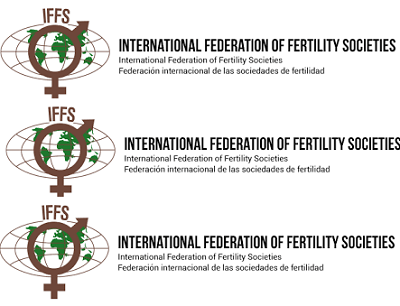
The workshop is organised for the benefit of medical practitioners interested in the field of Assisted Reproductive Technology, which include but not limited to, clinicians, embryologists, pharmacists, researchers, nurses, counsellors, and students.
Registration rates for the International Federation of Fertility Societies (IFFS) and the Association for Fertility and Reproductive Health (AFRH) IFFS-AFRH 2018 Workshop are listed below. Workshop registration will be available online and payment is accepted with a debit card. Early Registration is advised.
For More Information
Visit: http://www.afrhnigeria.org/view.html#!/IFFS2018 or IFFS Website: www.iffs-reproduction.org